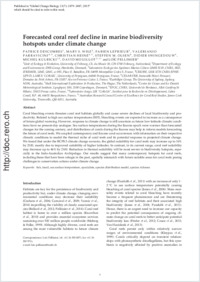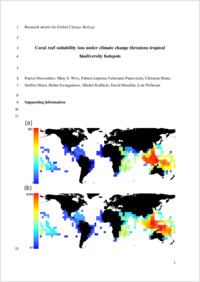Forecasted coral reef decline in marine biodiversity hotspots under climate change
- Descombes, Patrice Unit of Ecology & Evolution, University of Fribourg, Switzerland
- Wisz, Mary S. Department of Ecology and Environment, Hørsholm, Denmark
- Leprieur, Fabien Laboratoire Ecologie des Systèmes Marins Côtiers, Montpellier, France
- Parravicini, Valeriano CRIOBE, University of Perpignan, Perpignan, France - CESAB-FRB, Aix-en-Provence, France
- Heine, Christian EarthByte Group, The University of Sydney, Sydney, NSW, Australia - Shell International Exploration & Production, The Hague, The Netherlands
- Olsen, Steffen M. Center for Ocean and Ice Danish Meteorological Institute, Copenhagen, Denmark
- Swingedouw, Didier EPOC, CNRS, Université de Bordeaux, Pessac, France
- Kulbicki, Michel Laboratoire Arago, Institut pour la Recherche en Développement, Banyuls/mer, France
- Mouillot, David Laboratoire Ecologie des Systèmes Marins Côtiers, Montpellier, France - Australian Research Council Centre of Excellence for Coral Reef Studies, James Cook University, Townsville, Qld, Australia
- Pellissier, Loïc Unit of Ecology & Evolution, University of Fribourg, Switzerland
-
01.07.2015
Published in:
- Global Change Biology. - 2015, vol. 21, no. 7, p. 2479–2487
English
Coral bleaching events threaten coral reef habitats globally and cause severe declines of local biodiversity and productivity. Related to high sea surface temperatures (SST), bleaching events are expected to increase as a consequence of future global warming. However, response to climate change is still uncertain as future low-latitude climatic conditions have no present-day analogue. Sea surface temperatures during the Eocene epoch were warmer than forecasted changes for the coming century, and distributions of corals during the Eocene may help to inform models forecasting the future of coral reefs. We coupled contemporary and Eocene coral occurrences with information on their respective climatic conditions to model the thermal niche of coral reefs and its potential response to projected climate change. We found that under the RCP8.5 climate change scenario, the global suitability for coral reefs may increase up to 16% by 2100, mostly due to improved suitability of higher latitudes. In contrast, in its current range, coral reef suitability may decrease up to 46% by 2100. Reduction in thermal suitability will be most severe in biodiversity hotspots, especially in the Indo-Australian Archipelago. Our results suggest that many contemporary hotspots for coral reefs, including those that have been refugia in the past, spatially mismatch with future suitable areas for coral reefs posing challenges to conservation actions under climate change.
- Faculty
- Faculté des sciences et de médecine
- Department
- Département de Biologie
- Language
-
- English
- Classification
- Ecology and biodeversity
- License
-
License undefined
- Identifiers
-
- RERO DOC 257087
- DOI 10.1111/gcb.12868
- Persistent URL
- https://folia.unifr.ch/unifr/documents/304389
Other files
Statistics
Document views: 200
File downloads:
- pdf: 835
- Supplementary material: 224

